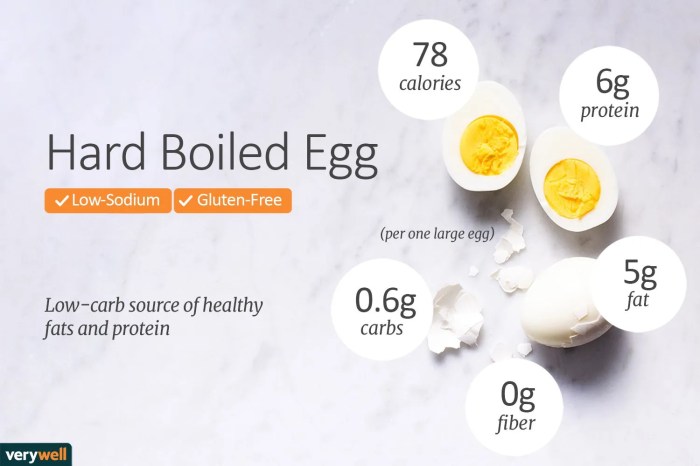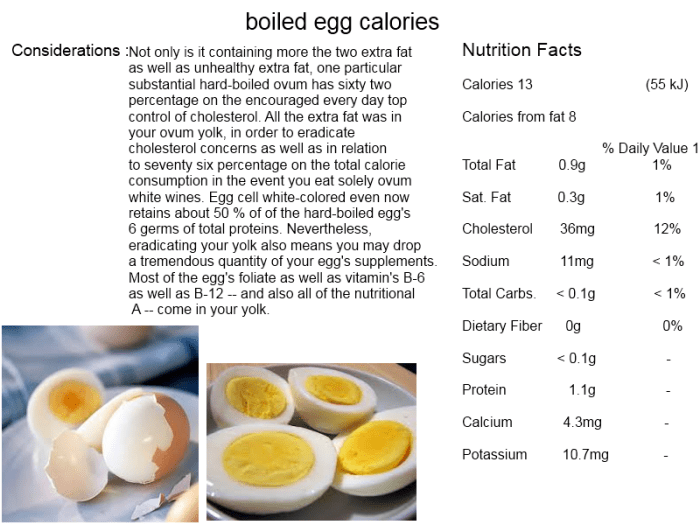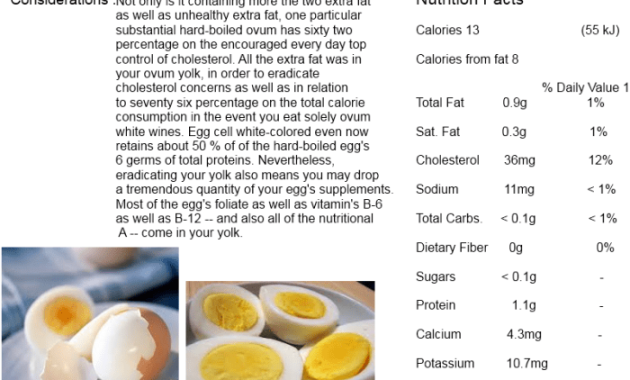Hard-Boiled Egg Whites in Different Diets

Hard boiled egg white nutrition facts – Hard-boiled egg whites offer a versatile and nutritious addition to a variety of dietary plans. Their high protein content and low fat make them a popular choice for those seeking to manage weight, build muscle, or improve overall health. Understanding how they integrate into different dietary approaches is crucial for maximizing their benefits.
Okay, so you’re all about that hard-boiled egg white protein, right? Super healthy, low-cal, perfect for your fitness goals. But let’s be real, sometimes you crave something sweet, something… Crumbl. Check out the crumbl cookie nutrition facts if you’re curious (just don’t overdo it!), then get back to those egg whites – balance is key, babe!
Hard-Boiled Egg Whites in Low-Carb Diets
Low-carbohydrate diets often emphasize protein and healthy fats. Hard-boiled egg whites perfectly complement this approach, providing a significant source of high-quality protein with minimal carbohydrates. This makes them an excellent addition to breakfast, lunch, or even as a snack. Their versatility allows for easy incorporation into various recipes, such as omelets (with added vegetables), salads, or as part of a low-carb frittata.
Remember that the overall carbohydrate content of the meal will depend on the accompanying ingredients.
Hard-Boiled Egg Whites in High-Protein Diets
High-protein diets are frequently employed for weight management, muscle building, or recovery from injury. Hard-boiled egg whites are an ideal food source for such diets. Their high protein content contributes to satiety, helps maintain muscle mass, and supports metabolic function. However, relying solely on egg whites isn’t recommended. A balanced high-protein diet should also include other sources of protein like lean meats, fish, legumes (if vegetarian), and dairy.
Hard-Boiled Egg Whites in Vegetarian Diets
For vegetarians, hard-boiled egg whites offer a readily available source of high-quality protein, especially important for those avoiding meat. However, vegetarians should ensure they’re consuming a balanced diet that includes a variety of protein sources from plant-based options like legumes, tofu, nuts, and seeds to complement the protein obtained from egg whites. This approach helps ensure they’re receiving all the essential amino acids necessary for optimal health.
Dietary Restrictions and Considerations
Egg allergies are a significant consideration. Those with egg allergies must strictly avoid consuming egg whites, even in hard-boiled form. Some individuals may also experience sensitivities to egg proteins, leading to digestive discomfort. If you have any concerns about egg allergies or sensitivities, consult with a healthcare professional or registered dietitian.
Adjusting Hard-Boiled Egg White Consumption
The appropriate amount of hard-boiled egg whites consumed daily varies significantly depending on individual factors such as age, activity level, overall diet, and health goals. Consulting a registered dietitian or nutritionist can provide personalized guidance. However, as a general guideline, individuals may adjust consumption based on their protein requirements and overall caloric needs. Excessive consumption of egg whites, without considering overall dietary balance, might lead to nutrient deficiencies or other health issues.
Example Meal Plans
| Dietary Approach | Breakfast | Lunch | Dinner |
|---|---|---|---|
| Low-Carb | 2 hard-boiled egg whites with spinach and avocado | Salad with 2 hard-boiled egg whites, mixed greens, and olive oil dressing | Grilled chicken breast with asparagus and 1 hard-boiled egg white |
| High-Protein | 3 hard-boiled egg whites, a small portion of Greek yogurt, and berries | Chicken salad sandwich (whole-wheat bread, optional) with 2 hard-boiled egg whites | Salmon with roasted vegetables and 2 hard-boiled egg whites |
| Vegetarian | Tofu scramble with 2 hard-boiled egg whites and vegetables | Lentil soup with whole-wheat bread and 1 hard-boiled egg white | Vegetarian chili with a side salad and 2 hard-boiled egg whites |
Preparation and Storage of Hard-Boiled Egg Whites: Hard Boiled Egg White Nutrition Facts

Proper preparation and storage of hard-boiled egg whites are crucial for maintaining their nutritional value and preventing spoilage. Following these guidelines ensures you can enjoy the benefits of this healthy food safely and effectively. Careful attention to detail in each step is key.
Preparing and storing hard-boiled egg whites involves a straightforward process. However, understanding the nuances of each step minimizes the risk of bacterial growth and maximizes the retention of nutrients.
Hard-Boiled Egg Preparation and White Separation, Hard boiled egg white nutrition facts
The following steps Artikel the process of preparing hard-boiled eggs and separating the whites from the yolks. Consistency in these steps contributes to achieving optimal results and reducing the chance of contamination.
- Place eggs in a single layer in a saucepan. Cover with cold water by about an inch.
- Bring the water to a rolling boil over high heat.
- Once boiling, immediately remove the pan from the heat, cover, and let the eggs sit in the hot water for 12-15 minutes for large eggs (adjust time slightly for different sizes). This method helps prevent green rings around the yolk.
- Transfer the eggs to a bowl of ice water to stop the cooking process. This rapid cooling helps prevent further cooking and makes peeling easier.
- Once cool enough to handle, gently tap the eggs all over on a hard surface to create cracks in the shell.
- Peel the eggs under cold running water. The water helps to loosen the shell from the egg white.
- Carefully slice the egg in half lengthwise.
- Using a spoon, gently scoop out the yolk, leaving the egg white intact.
Storage of Hard-Boiled Egg Whites
Appropriate storage methods are vital to maintain the quality and safety of hard-boiled egg whites. Improper storage can lead to rapid spoilage and potential health risks.
Store hard-boiled egg whites in an airtight container in the refrigerator. Ideally, use them within 3-4 days for optimal freshness and to minimize the risk of bacterial growth. Separate storage from other foods is also recommended to prevent cross-contamination.
Preventing Spoilage and Identifying Spoiled Egg Whites
Recognizing signs of spoilage is crucial to avoid consuming potentially harmful food. Careful attention to appearance, smell, and texture can prevent foodborne illnesses.
Spoiled hard-boiled egg whites may exhibit a foul odor, slimy texture, or a greenish discoloration. If any of these signs are present, discard the egg whites immediately. Remember, when in doubt, throw it out. Prioritizing food safety is paramount.
Expert Answers
Are hard-boiled egg whites a good source of iron?
While not a primary source, hard-boiled egg whites do contain a small amount of iron. However, other foods are significantly better sources.
Can I eat hard-boiled egg whites every day?
Moderation is key. Daily consumption is generally safe for most individuals, but excessive intake may lead to potential issues related to cholesterol or other dietary factors. Consult a healthcare professional or registered dietitian for personalized advice.
How long can I store hard-boiled egg whites in the refrigerator?
Stored properly in an airtight container, hard-boiled egg whites generally remain safe for consumption for up to 4 days. Always check for signs of spoilage before consuming.
Are hard-boiled egg whites suitable for people with egg allergies?
No. Individuals with egg allergies should avoid consuming hard-boiled egg whites or any egg products.

